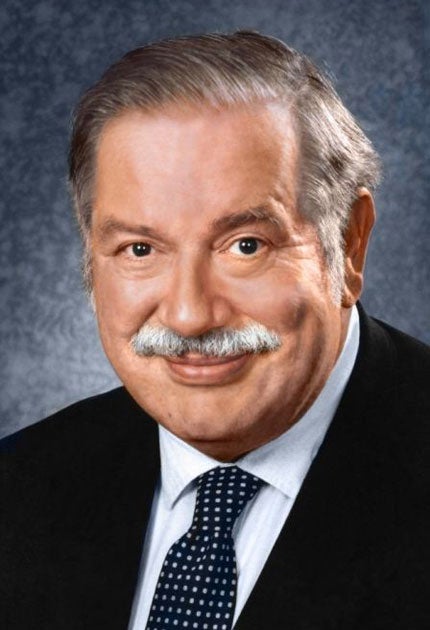Moishe Rosen: Evangelist who founded the Jews for Jesus movement

Born to Jewish parents in the American Midwest during the depression years, Martin "Moishe" Rosen converted to Christianity when he was 21, became a Baptist minister and founded Jews for Jesus, an organisation that spread worldwide with the aim of converting Jews to believe in Jesus as the Messiah. Like him, the group's followers consider themselves Jews by identity, but not religion, and have become the largest messianic Jewish organisation in the world. They describe Rosen as "the godfather of Jewish evangelism".
By seeking to convert Jews to Christianity, however, he and the group have been vociferously criticised by mainstream Jewish organisations, which denounce the organisation as "cultist", consider it a threat to the Jewish faith and have described its aims as "spiritual genocide". Many Christian organisations, too, are highly critical, saying the evangelical zeal of Jews for Jesus has crossed the line by seeking to destroy the Jewish faith rather than working with it.
Describing Rosen's flamboyant and controversial style, one Denver Baptist leader, Dr Vernon Grounds, said: "When Moishe Rosen came into a city, there was either a revival or a riot." Muslim imams and community leaders in the US and the UK joined in the criticism, saying that Christian missionary groups seeking to convert Muslims have followed the Jews for Jesus model in recent years by targeting young Muslims with leaflets, phone calls or door-stepping.
Rosen got the idea for his Jews for Jesus movement in the late 1960s in San Francisco, partly influenced, he said, by flower power and the tendency among young hippies to seek alternative religion or solutions. He was also inspired by the persuasive power and communication skills of fiery anti-Vietnam War protesters and formally founded his group in 1973. Often arriving alone with a batch of leaflets in San Francisco's People's Park, he began preaching to young Jews that they could believe in Jesus without giving up their Jewish identity or culture. He caught people's attention through what he called "broadsides" – leaflets he wrote himself, using pop and rock imagery with such titles as "If Being Born Hasn't Given You Satisfaction, Try Being Born Again".
Responding to criticism from mainstream Jews, he told a California newspaper in 1994 with his customary dry wit: "If the Jews didn't need Jesus, why didn't he come by way of Norway or Ireland?"
Martin Meyer Rosen was born in 1932 in Kansas City to Ben Rosen and Rose Baker, both Orthodox Jews from Central Europe, although, as he later wrote, they were not "frum" (strictly observant) and indeed, once established in the US, were critical of their fellow Orthodox Jews' reluctance to integrate with their Christian neighbours. Once the family had moved to Denver, Colorado however, the Orthodox synagogue in the city became a key part of his education.
At the University of Colorado he met a young Jewish woman, Ceil Starr, and they married in his Denver synagogue in 1950. Three years later, however, she was converted by an evangelical Christian preacher and her husband followed suit. He enrolled in a bible college in New Jersey, was ordained as a Baptist minister in 1957 and moved to Los Angeles to serve with the American Board of Missions to the Jews, now known as Chosen People Ministries, which seeks to "share the knowledge of Yeshua (Jesus) with God's chosen people." He spent 16 years with the Board before forming Jews for Jesus in 1973, adopting his childhood Yiddish name Moishe for greater recognition among the Jewish community.
Jews for Jesus does not have members, only followers and office staff in a dozen countries, including in Europe, Israel and Russia. The worldwide group claims around 200,000 followers and prints and distributes millions of leaflets a year – with titles such as "Jesus Made Me Kosher" and "On the First Day of Christmas My Rabbi Gave to Me" – and has an annual budget of $13m. Rosen stood down as executive director on his retirement in 1996, but continued to be involved, most recently through his ministry on its website.
"I never made the decision that I wanted to leave the Jewish community," he once said. "We've been ostracised. We want a climate where all ideas can be accepted or rejected without previous indoctrination. You can take from me everything but my Jewishness and my belief in God. You can say I'm a nuisance, a Christian, out of step with the Jewish community, but you can't say I'm not a Jew."
Rosen maintained his Jewish identity, observing Passover and fasting on Yom Kippur. He asked to be buried in his tallit, the Jewish prayer shawl. In a farewell message on his organisation's website, he wrote: "I hope I can count on you to show love and respect for the Jewish people, but Jewishness never saved anybody ... Within Judaism today, there is no salvation because Christ has no place within Judaism."
Martin Meyer (Moishe) Rosen, evangelist: born Kansas City, Missouri 12 April 1932; married 1950 Ceil Starr (two daughters); died San Francisco 19 May 2010.
Subscribe to Independent Premium to bookmark this article
Want to bookmark your favourite articles and stories to read or reference later? Start your Independent Premium subscription today.

Join our commenting forum
Join thought-provoking conversations, follow other Independent readers and see their replies